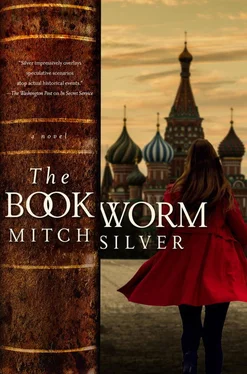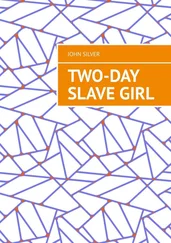“Painful, isn’t it, to find out you’ve been wrong all these years? Or would you rather go on believing in your own theory and unwilling to face the facts, like all those other historians you discredit?”
She took a breath and faced him. “All right, why are you really giving these… things… to me?”
“If you must know, I, we, think they’re a road map to something, a treasure map if you will. And that you’re the only person in all of Moscow with access to the Dictaphone machines who has the brains and the determination—and who knows the Arkhiv like the back of her hand—the only one who can listen to them and lead us to the treasure.”
“Who’s ‘we’? And what kind of treasure?”
“Russians… patriots… people who don’t buy the conventional fiction about the war. As for the treasure, it’s a book; one that Adolf Hitler was given. Rumor has it he wrote something down in it, a confession, a message for posterity maybe, or a last will and testament. Whatever it is, it’s valuable.”
“I don’t see how—”
He held up a finger. “You’re going to say you don’t see how a full professor can waste her valuable time on a ‘wild-goose chase’ looking for some musty old tome. We understand. That’s why we’re prepared to pay you a million rubles.”
“A mil—I don’t understand.”
The tough who called himself a messenger pushed the bag of tins toward her one more time and said, “It’s a valuable book, if it still exists. Listen to the recordings, my beautiful Dr. Klimt; follow the clues. Find what we’re looking for, and there’s a million-ruble… uh… finder’s fee.”
He was already on his way to the door. Lara picked up the shopping bag and hurried over to him, putting the handles firmly in his hand. “I’m sorry, I can’t possibly.”
“Is that your final word?”
“ Prostitye , I’m sorry, it is.”
The man turned to go. Lara went back to the lectern to gather up her things. She heard the door to the classroom close.
Lara turned out the lights and left the room. In the crowded corridor, with students hurrying in all directions to change classes, the scruffy young man was nowhere to be seen. Lara took a step toward her office down the hall and her foot bumped into something on the floor, a shopping bag filled with Dictaphone recordings.
Chapter 11

The Radisson Slavyanskaya, put up in the first wave of glasnost , loomed ahead of Lara against the threatening sky. There was more than a hint of autumn’s coming chill in the breeze blowing off the Moskva, and Lara, hurrying because she was late, did up the next highest button of her light coat.
Other, newer hotels were located closer to Red Square, so the Slavyanskaya’s proprietors were determined that dining should be their marketing angle. One could choose the Talavera Restaurant, featuring Mediterranean cuisine, or one of the two cafés catering to mitteleuropeans . To the left of the lobby, Sumosan boasted “the best Japanese sushi in Moscow.”
A rack near the door of the bookshop/newsstand held the German-language version of the afternoon paper, Izvestia . Its banner headline read, KREMLIN SET TO WELCOME WORLD LEADERS. Really? This week? Lara made a mental note to lift her nose out of her books every once in a while.
She quickly picked up the paper. A not particularly flattering picture of the Russian head of state was placed next to that of the American president. Lara noticed another headline, below the fold: WEST CONDEMNS USE OF FORCE AGAINST RED SQUARE PROTESTERS. She put the paper back in the rack.
In the vast Russky restaurant, “serving authentic Russian cuisine from the time of the tsars,” Lara handed her coat and the unwanted shopping bag full of metal tins to the garderob , who must have been ninety if she was a day. Maybe, Lara thought, she’d leave the bag there on the shelf when she got her coat.
The woman on the phone taking a reservation was the “ Maitresse D ,” according to the plastic card on her blouse. Lara noticed the freestanding sign nearby announcing: THE RADISSON SLAVYANSKAYA CELEBRATES INTERNATIONAL WEEK. Below it was the special “global menu” the chef had prepared in honor of the visiting dignitaries, which seemed to be mostly familiar Russian entrées paired with other countries’ vegetables, starting with shashlik and Brussels sprouts. Hmm.
Next to it, a smaller sign announced: THE RADISSON SLAVYANSKAYA WELCOMES… TOR. A quick glance around failed to disclose at which tables sat the reforming firebrands of Garry Kasparov’s opposition coalition, The Other Russia. Dismissed as a debating team years ago because they were unable to agree on a candidate to run against Putin, TOR was now, ironically, the official bogeyman, blamed for orchestrating the popular antigovernment protests that were popping up everywhere.
Political dissidents? The people having lunch here seemed accustomed to the nicer things, people who liked things just the way they were. Like the fact that the tablecloths were actually white, and they weren’t shiny with too much washing, the way they were in the places the tourists never saw.
The officious Maitresse put down the phone. Lara gave her name, and the woman deigned to smile at this academic in sober clothes standing before her. Their host must have pull. “Dr. Klimt, your party is already here.”
Pavel, in his one presentable jacket, stood up only because the other man did, a striking someone in an expensive suit. Lara took him at first to be Pierce Brosnan from the James Bond films. Pavel was saying, too familiarly, “Grigoriy Aleksandrovich, this is the woman I was telling you about, my friend, Professor Klimt. Larissa Mendelova, may I introduce my boss’s boss’s boss, Director Gerasimov.”
“ Prostitye … I was delayed.”
“Not at all.” The head of the Russian State TV and Radio Company Ostankino—more familiarly known by its old name, Gosteleradio—held Lara’s chair for her. This was altogether a different sort of Russian man than she was used to. When they were seated he announced, “I took the liberty of ordering a bottle of wine, Dr. Klimt. I hope you won’t mind.”
Hmm, she thought, wine with lunch… not your typical Tuesday.
He went on, in English. “Pavel has been singing your praises. He tells me you are one of our largest historians.”
She turned to Pavel and, in Russian, reproached him with a smile. “Largest? Really?”
Immediately, Gerasimov understood his mistake. “ Prostitye , forgive me, Larissa Mendelova.” The tops of his ears were pink with embarrassment. “This is what happens when you teach yourself English by watching U.S. television. I know all the words but, still, my sentences… permit me to try my compliment again: I am honored to meet one of Moscow’s greatest historians.”
Also in English, she replied, “Thank you, but that’s only because all our truly great historians are still in the Urals, in the camps.”
The man seemed about to laugh, but stopped himself. She figured he could hear English well enough. “Surely not anymore.”
“No, I make the occasional joke.” Lara watched the waiter open the wine bottle before adding, “Of course, actual history has only been allowed to occur in the last twenty years, so I suppose I got in on the ground floor.”
Now the man did laugh. Pavel, on the other hand, looked stricken.
Gerasimov changed the subject. “I’ve spent the last couple of days with your writing, Dr. Klimt.”
She quickly put in, “Please, it’s Lara.”
Читать дальше













